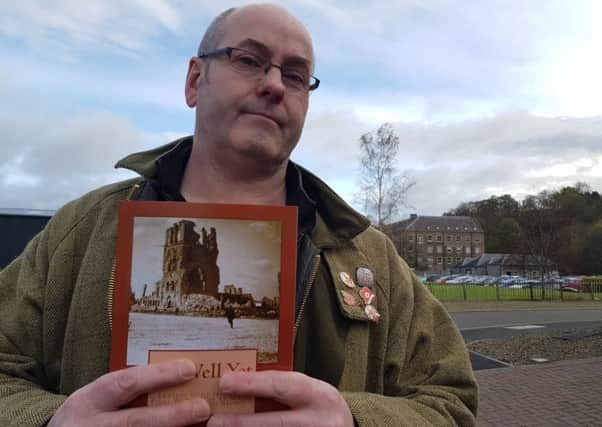Evocative letters from the front


Tim Brown became interested in the project after reading the letters sent by his paternal grandfather William Neilson Brown to his aunt Minnie McGillivray of Galashiels.
They were written, mostly from the front line trenches all over Europe between 1915-1918, by William, who quickly rose through the ranks to become Major. He volunteered for service with the Army Service Corps in Japan before returning home and joining the 2nd batallion, Gordon Highlanders in 1915.
Advertisement
Hide AdAdvertisement
Hide AdTim said: “With everyone now looking back to 1918, these letters – some of which are very graphic, yet are so moving.
“They are also well-written, with William being a writer to trade – he was editor of the Border Standard, which is now the Border Telegraph.
“Some of the letters were written as he was under heavy fire, and the handwriting shows the stress he was under.
“They are as evocative a record of what it was like in the trenches as anything else.”
Advertisement
Hide AdAdvertisement
Hide AdDuring his service, William was wounded twice, and won the military medal for bravery in Italy, Belgium and France, as well as several other awards.
Most of his letters are prefaced with the three words “All well yet”, which is the title of the book,
The theme of freezing cold mud seems to be a constant.
One letter, written in France in 1916, states: “All well yet. The weather has been frightful and we are exposed owing to German frightfulness. Heavy snow has made everything very miserable. All signs of spring have disappeared, but the year is getting on and it is bound to improve some time.
“Everywhere are signs of the Germans’ two and a half years tenure here. Every village has miles of wire round it and heaps of refuse, graves well kept and covered with tributes to Fritz and Hans.”
Advertisement
Hide AdAdvertisement
Hide AdIt goes on: “The machine gun has made a revolution in warfare and the rear guards are now most formidable.
“We must hope for the best and a quick finish and trust we will not have another winter.”
Another, written on October 5, 1917, begins “All well yet. We have just come out of the worst action I have ever seen. I got through again, my luck is great. Many good chaps have gone out, some of my old friends, Callum Graham got his arm taken off and died. The mud is awful, it makes life impossible and yet we go on.”
But through even the worst of times, his dry wit shone through. Later in the same letter, he writes: “Winter is coming on us and there is not much hope of comfort for some time to come, however, we have got the thanks of parliament and that is always something. If you could send me a kippered salmon, it would be much appreciated, and a change.”
Advertisement
Hide AdAdvertisement
Hide AdAnd in amongst the trials of war, he writes a passable travelogue. In another letter, he wrote of his visit to St Mark’s Basilica in Venice: “To our northern eyes, the decoration of church in the style of a first rate gin palace is a bit disconcerting.”
William Neilson Brown made it through the war, and died, aged 70, in August 1953, and was buried in Waird’s cemetery in Melrose.
Copies of the book can be purchased, for £9.99, at www.allwellyet.co.uk